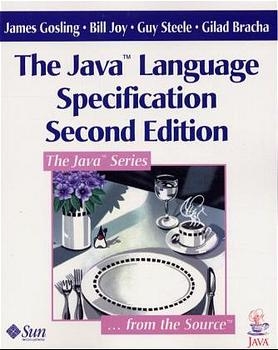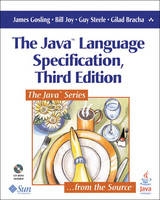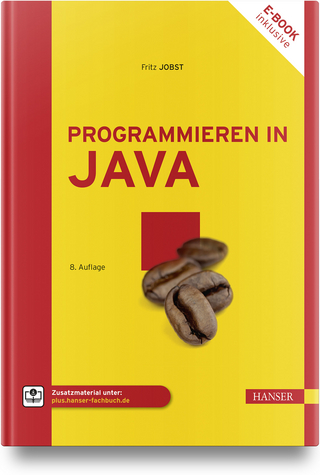
Java Language Specification
Addison Wesley (Verlag)
978-0-201-31008-5 (ISBN)
- Titel erscheint in neuer Auflage
- Artikel merken
For nearly five years, one book has served as the definitive reference to Java for all serious developers: The Java Language Specification, by James Gosling, Bill Joy, and Guy Steele. Now, these world-renowned Java authorities (along with new co-author Gilad Bracha) have delivered a monumental update. This completely revised Second Edition covers the Java 2aA A Platform Standard Edition Version 1.3 with unprecedented depth and precision, offering the invaluable insights of Java's creators to every developer. There is no better source for learning everything about the Syntax and Semantics of the Java programming language. Developers will turn to this book again and again.
Bill Joy is a cofounder of Sun Microsystems, where he led the company's technical strategy until September 2003, working on both hardware and software architecture. He is well known as the creator of the Berkeley version of the UNIX® operating system, for which he received a lifetime achievement award from the USENIX Association in 1993. He received the ACM Grace Murray Hopper Award in 1986. Joy has had a central role in shaping the Java programming language. He joined KPCB as Partner in January 2005. Guy L. Steele Jr. is a Sun Fellow at Sun Microsystems Laboratories, where he is responsible for research in language design and implementation strategies, parallel algorithms, and computer arithmetic. He is well known as the cocreator of the Scheme programming language and for his reference books for the C programming language (with Samuel Harbison) and for the Common Lisp programming language. Steele received the ACM Grace Murray Hopper Award in 1988 and was named an ACM Fellow in 1994, a member of the National Academy of Engineering in 2001, and a fellow of the American Academy of Arts and Science in 2002. He also received the 1996 ACM SIGPLAN Programming Languages Achievement Award and the 2005 Dr. Dobb's Journal Excellence in Programming Award. Gilad Bracha is Computational Theologist at Sun Microsystems, and a researcher in the area of object-oriented programming. Prior to joining Sun, he worked on Strongtalk,™ the Animorphic Smalltalk System. He holds a B.S. in mathematics and computer science from Ben Gurion University in Israel and a Ph.D. in computer science from the University of Utah. James Gosling is a Fellow and Chief Technology Officer of Sun's Developer Products group, the creator of the Java programming language, and one of the computer industry's most noted programmers. He is the 1996 recipient of Software Development's "Programming Excellence Award." He previously developed NeWS, Sun's network-extensible window system, and was a principal in the Andrew project at Carnegie Mellon University, where he earned a Ph.D. in computer science.
Preface.
Preface to the Second Edition.
1. Introduction.
Example Programs.
Notation.
Relationship to Predefined Classes and Interfaces.
References.
2. Grammars.
Context-Free Grammars.
The Lexical Grammar.
The Syntactic Grammar.
Grammar Notation.
3. Lexical Structure.
Unicode.
Lexical Translations.
Unicode Escapes.
Line Terminators.
Input Elements and Tokens.
White Space.
Comments.
Identifiers.
Keywords.
Literals.
Integer Literals.
Floating-Point Literals.
Boolean Literals.
Character Literals.
String Literals.
Escape Sequences for Character and String Literals.
The Null Literal.
Separators.
Operators.
4. Types, Values, and Variables.
The Kinds of Types and Values.
Primitive Types and Values.
Integral Types and Values.
Integer Operations.
Floating-Point Types, Formats, and Values.
Floating-Point Operations.
The boolean Type and boolean Values.
Reference Types and Values
Objects.
The Class Object.
The Class String.
When Reference Types Are the Same.
Where Types Are Used.
Variables.
Variables of Primitive Type.
Variables of Reference Type.
Kinds of Variables.
Final Variables.
Initial Values of Variables.
Types, Classes, and Interfaces.
5. Conversions and Promotions.
Kinds of Conversion.
Identity Conversions.
Widening Primitive Conversion.
Narrowing Primitive Conversions.
Widening Reference Conversions.
Narrowing Reference Conversions.
String Conversions.
Forbidden Conversions.
Value Set Conversion.
Assignment Conversion.
Method Invocation Conversion.
String Conversion.
Casting Conversion.
Numeric Promotions.
Unary Numeric Promotion.
Binary Numeric Promotion.
6. Names.
Declarations.
Names and Identifiers.
Scope of a Declaration.
Shadowing Declarations.
Obscured Declarations.
Members and Inheritance.
The Members of a Package.
The Members of a Class Type.
The Members of an Interface Type.
The Members of an Array Type.
Determining the Meaning of a Name.
Syntactic Classification of a Name According to Context.
Reclassification of Contextually Ambiguous Names.
Meaning of Package Names.
Simple Package Names.
Qualified Package Names.
Meaning of PackageOrTypeNames.
Simple PackageOrTypeNames.
Qualified PackageOrTypeNames.
Meaning of Type Names.
Simple Type Names.
Qualified Type Names.
Meaning of Expression Names.
Simple Expression Names.
Qualified Expression Names.
Meaning of Method Names.
Simple Method Names.
Qualified Method Names.
Access Control.
Determining Accessibility.
Details on protected Access.
Access to a protected Member.
Qualified Access to a protected Constructor.
An Example of Access Control.
Example: Access to public and Non-public Classes.
Example: Default-Access Fields, Methods, and Constructors.
Example: public Fields, Methods, and Constructors.
Example: protected Fields, Methods, and Constructors.
Example: private Fields, Methods, and Constructors.
Fully Qualified Names and Canonical Names.
Naming Conventions.
Package Names.
Class and Interface Type Names.
Method Names.
Field Names.
Constant Names.
Local Variable and Parameter Names.
7. Packages.
Package Members.
Host Support for Packages.
Storing Packages in a File System.
Storing Packages in a Database.
Compilation Units.
Package Declarations.
Named Packages.
Unnamed Packages.
Observability of a Package.
Scope of a Package Declaration.
Import Declarations.
Single-Type-Import Declaration.
Type-Import-on-Demand Declaration.
Automatic Imports.
A Strange Example.
Top Level Type Declarations.
Unique Package Names.
8. Classes.
Class Declaration.
Class Modifiers.
abstract Classes.
final Classes.
strictfp Classes.
Inner Classes and Enclosing Instances.
Superclasses and Subclasses.
Superinterfaces.
Class Body and Member Declarations.
Class Members.
Examples of Inheritance.
Example: Inheritance with Default Access.
Inheritance with public and protected.
Inheritance with private.
Accessing Members of Inaccessible Classes.
Field Declarations.
Field Modifiers.
static Fields.
final Fields.
transient Fields.
volatile Fields.
Initialization of Fields.
Initializers for Class Variables.
Initializers for Instance Variables.
Restrictions on the use of Fields during Initialization.
Examples of Field Declarations.
Example: Hiding of Class Variables.
Example: Hiding of Instance Variables.
Example: Multiply Inherited Fields.
Example: Re-inheritance of Fields.
Method Declarations.
Formal Parameters.
Method Signature.
Method Modifiers.
abstract Methods.
static Methods.
final Methods.
native Methods.
strictfp Methods.
synchronized Methods.
Method Throws.
Method Body.
Inheritance, Overriding, and Hiding.
Overriding (by Instance Methods).
Hiding (by Class Methods).
Requirements in Overriding and Hiding.
Inheriting Methods with the Same Signature.
Overloading.
Examples of Method Declarations.
Example: Overriding.
Example: Overloading, Overriding, and Hiding.
Example: Incorrect Overriding.
Example: Overriding versus Hiding.
Example: Invocation of Hidden Class Methods.
Large Example of Overriding.
Example: Incorrect Overriding because of Throws.
Member Type Declarations.
Access Modifiers.
Static Member Type Declarations.
Instance Initializers.
Static Initializers.
Constructor Declarations.
Formal Parameters.
Constructor Signature.
Constructor Modifiers.
Constructor Throws.
Constructor Body.
Explicit Constructor Invocations.
Constructor Overloading.
Default Constructor.
Preventing Instantiation of a Class.
9. Interfaces.
Interface Declarations.
Interface Modifiers.
abstract Interfaces.
strictfp Interfaces.
Superinterfaces and Subinterfaces.
Interface Body and Member Declarations.
Access to Interface Member Names.
Interface Members.
Field (Constant) Declarations.
Initialization of Fields in Interfaces.
Examples of Field Declarations.
Ambiguous Inherited Fields.
Multiply Inherited Fields.
Abstract Method Declarations.
Inheritance and Overriding.
Overloading.
Examples of Abstract Method Declarations.
Example: Overriding.
Example: Overloading.
Member Type Declarations.
10. Arrays.
Array Types.
Array Variables.
Array Creation.
Array Access.
Arrays: A Simple Example.
Array Initializers.
Array Members.
Class Objects for Arrays.
An Array of Characters is Not a String.
Array Store Exception.
11. Exceptions.
The Causes of Exceptions.
Compile-Time Checking of Exceptions.
Why Errors are Not Checked.
Why Runtime Exceptions are Not Checked.
Handling of an Exception.
Exceptions are Precise.
Handling Asynchronous Exceptions.
An Example of Exceptions.
The Exception Hierarchy.
Loading and Linkage Errors.
Virtual Machine Errors.
12. Execution.
Virtual Machine Start-Up.
Load the Class Test.
Link Test: Verify, Prepare, (Optionally) Resolve.
Initialize Test: Execute Initializers.
Invoke Test.main.
Loading of Classes and Interfaces.
The Loading Process.
Linking of Classes and Interfaces.
Verification of the Binary Representation.
Preparation of a Class or Interface Type.
Resolution of Symbolic References.
Initialization of Classes and Interfaces.
When Initialization Occurs.
Detailed Initialization Procedure.
Initialization: Implications for Code Generation.
Creation of New Class Instances.
Finalization of Class Instances.
Implementing Finalization.
Finalizer Invocations are Not Ordered.
Unloading of Classes and Interfaces.
Program Exit.
13. Binary Compatibility.
The Form of a Binary.
What Binary Compatibility Is and Is Not.
Evolution of Packages.
Evolution of Classes.
Abstract Classes.
Final Classes.
Public Classes.
Superclasses and Superinterfaces.
Class Body and Member Declarations.
Access to Members and Constructors.
Field Declarations.
Final Fields and Constants.
Static Fields.
Transient Fields.
Method and Constructor Declarations.
Method and Constructor Parameters.
Method Result Type.
Abstract Methods.
Final Methods.
Native Methods.
Static Methods.
Synchronized Methods.
Method and Constructor Throws.
Method and Constructor Body.
Method and Constructor Overloading.
Method Overriding.
Static Initializers.
Evolution of Interfaces.
Public Interfaces.
Superinterfaces.
The Interface Members.
Field Declarations.
Abstract Method Declarations.
14. Blocks and Statements.
Normal and Abrupt Completion of Statements.
Blocks.
Local Class Declarations.
Local Variable Declaration Statements.
Local Variable Declarators and Types.
Scope of Local Variable Declarations.
Shadowing of Names by Local Variables.
Execution of Local Variable Declarations.
Statements.
The Empty Statement.
Labeled Statements.
Expression Statements.
The if Statement.
The if—then Statement.
The if—then—else Statement.
The switch Statement.
The while Statement.
Abrupt Completion.
The do Statement.
Abrupt Completion.
Example of do statement.
The for Statement.
Initialization of for statement.
Iteration of for statement.
Abrupt Completion of for statement.
The break Statement.
The continue Statement.
The return Statement.
The throw Statement.
The synchronized Statement.
The try statement.
Execution of try—catch.
Execution of try—catch—finally.
Unreachable Statements.
15. Expressions.
Evaluation, Denotation, and Result.
Variables as Values.
Type of an Expression.
FP-strict Expressions.
Expressions and Run-Time Checks.
Normal and Abrupt Completion of Evaluation.
Evaluation Order.
Evaluate Left-Hand Operand First.
Evaluate Operands before Operation.
Evaluation Respects Parentheses and Precedence.
Argument Lists are Evaluated Left-to-Right.
Evaluation Order for Other Expressions.
Primary Expressions.
Lexical Literals.
Class Literals.
this.
Qualified this.
Parenthesized Expressions.
Class Instance Creation Expressions.
Determining the Class being Instantiated.
Determining Enclosing Instances.
Choosing the Constructor and its Arguments.
Run-time Evaluation of Class Instance Creation Expressions.
Anonymous Class Declarations.
Anonymous Constructors.
Example: Evaluation Order and Out-of-Memory Detection.
Array Creation Expressions.
Run-time Evaluation of Array Creation Expressions.
Example: Array Creation Evaluation Order.
Example: Array Creation and Out-of-Memory Detection.
Field Access Expressions.
Field Access Using a Primary.
Accessing Superclass Members using super.
Method Invocation Expressions.
Compile-Time Step 1: Determine Class or Interface to Search.
Compile-Time Step 2: Determine Method Signature.
Find Methods that are Applicable and Accessible.
Choose the Most Specific Method.
Example: Overloading Ambiguity.
Example: Return Type Not Considered.
Example: Compile-Time Resolution.
Compile-Time Step 3: Is the Chosen Method Appropriate?
Runtime Evaluation of Method Invocation.
Compute Target Reference (If Necessary).
Evaluate Arguments.
Check Accessibility of Type and Method.
Locate Method to Invoke.
Create Frame, Synchronize, Transfer Control.
Example: Target Reference and Static Methods.
Example: Evaluation Order.
Example: Overriding.
Example: Method Invocation using super.
Array Access Expressions.
Runtime Evaluation of Array Access.
Examples: Array Access Evaluation Order.
Postfix Expressions.
Postfix Increment Operator.
Postfix Decrement Operator.
Unary Operators.
Prefix Increment Operator.
Prefix Decrement Operator.
Unary Plus Operator.
Unary Minus Operator.
Bitwise Complement Operator ~
Logical Complement Operator !
Cast Expressions.
Multiplicative Operators.
Multiplication Operator *
Division Operator /
Remainder Operator %
Additive Operators.
String Concatenation Operator +
String Conversion.
Optimization of String Concatenation.
Examples of String Concatenation.
Additive Operators (+ and -) for Numeric Types.
Shift Operators.
Relational Operators.
Numerical Comparison Operators <, <=, >, and >=.
Type Comparison Operator instanceof.
Equality Operators.
Numerical Equality Operators == and !=
Boolean Equality Operators == and !=
Reference Equality Operators == and !=
Bitwise and Logical Operators.
Integer Bitwise Operators &, ^, and |
Boolean Logical Operators &, ^, and |
Conditional-And Operator &&
Conditional-Or Operator ||
Conditional Operator ? :
Assignment Operators.
Simple Assignment Operator =
Compound Assignment Operators.
Expression.
Constant Expression.
16. Definite Assignment.
Definite Assignment and Expressions.
Boolean Constant Expressions.
The Boolean Operator &&
The Boolean Operator ||
The Boolean Operator !
The Boolean Operator ? :
The Conditional Operator ? :
Assignment Expressions.
Operators ++ and --
Other Expressions.
Definite Assignment and Statements.
Empty Statements.
Blocks.
Local Class Declaration Statements.
Local Variable Declaration Statements.
Labeled Statements.
Expression Statements.
if Statements.
switch Statements.
while Statements.
do Statements.
for Statements.
Initialization Part.
Incrementation Part.
break, continue, return, and throw Statements.
synchronized Statements.
try Statements.
Definite Assignment and Parameters.
Definite Assignment and Array Initializers.
Definite Assignment and Anonymous Classes.
Definite Assignment and Member Types.
Definite Assignment and Static Initializers.
Definite Assignment, Constructors, and Instance Initializers.
17. Threads and Locks.
Terminology and Framework.
Execution Order.
Rules about Variables.
Nonatomic Treatment of double and long.
Rules about Locks.
Rules about the Interaction of Locks and Variables.
Rules for Volatile Variables.
Prescient Store Actions.
Discussion.
Example: Possible Swap.
Example: Out-of-Order Writes.
Threads.
Locks and Synchronization.
Wait Sets and Notification.
18. Syntax.
The Grammar of the Java Programming Language.
Index.
Credits.
Colophon. 0201310082T04062001
| Erscheint lt. Verlag | 10.7.2000 |
|---|---|
| Verlagsort | Boston |
| Sprache | englisch |
| Maße | 187 x 233 mm |
| Gewicht | 805 g |
| Themenwelt | Informatik ► Programmiersprachen / -werkzeuge ► Java |
| Mathematik / Informatik ► Informatik ► Web / Internet | |
| ISBN-10 | 0-201-31008-2 / 0201310082 |
| ISBN-13 | 978-0-201-31008-5 / 9780201310085 |
| Zustand | Neuware |
| Informationen gemäß Produktsicherheitsverordnung (GPSR) | |
| Haben Sie eine Frage zum Produkt? |
aus dem Bereich



